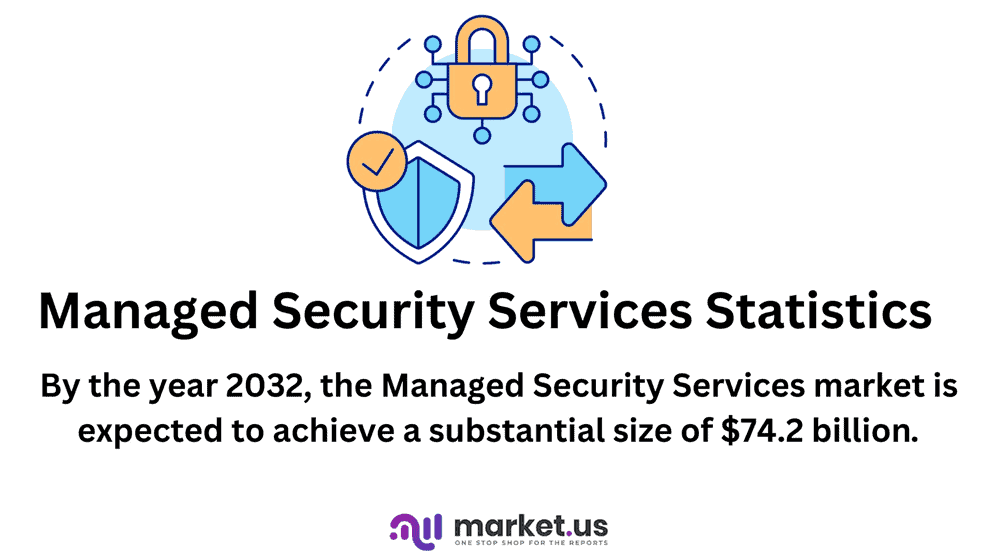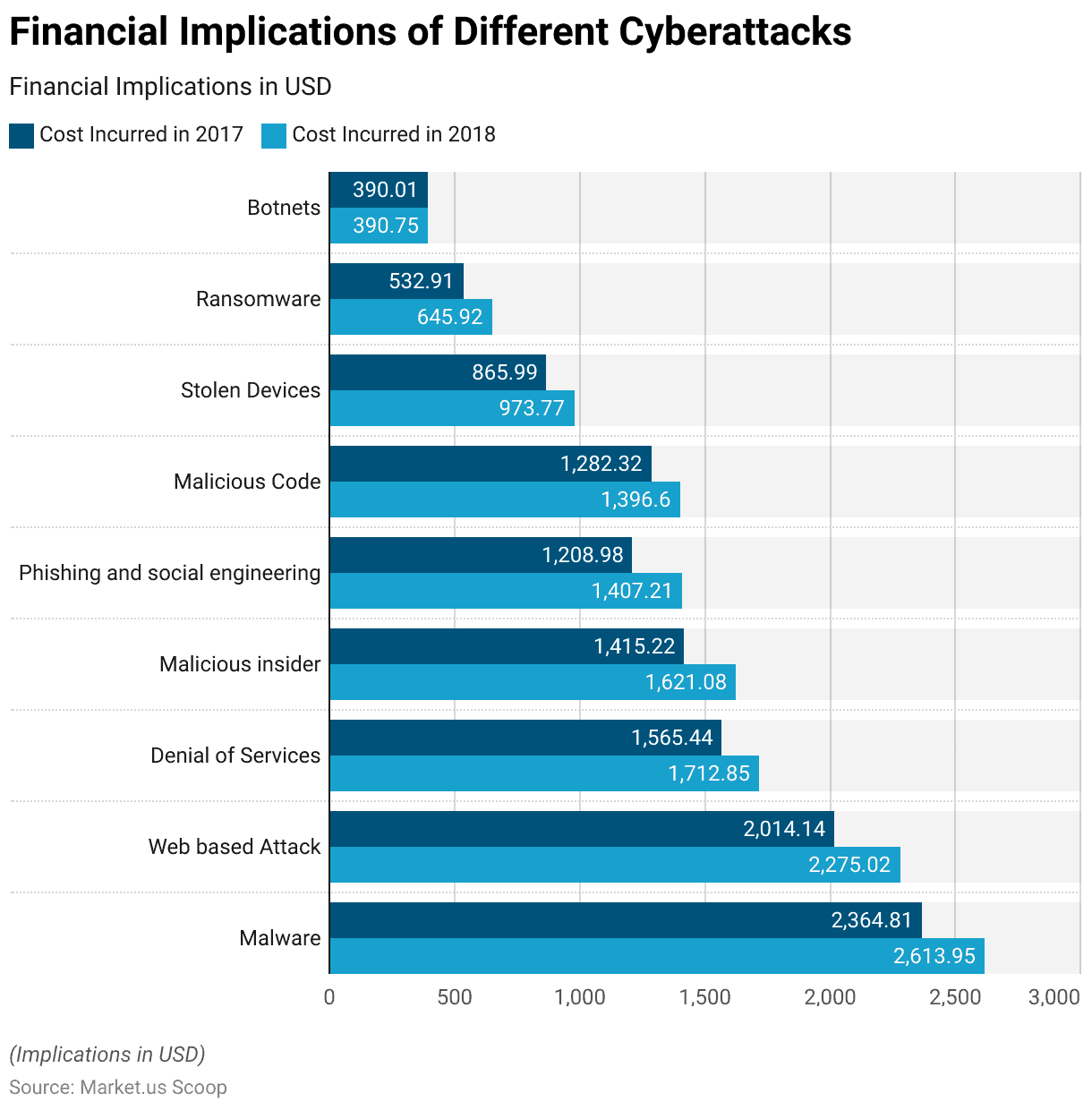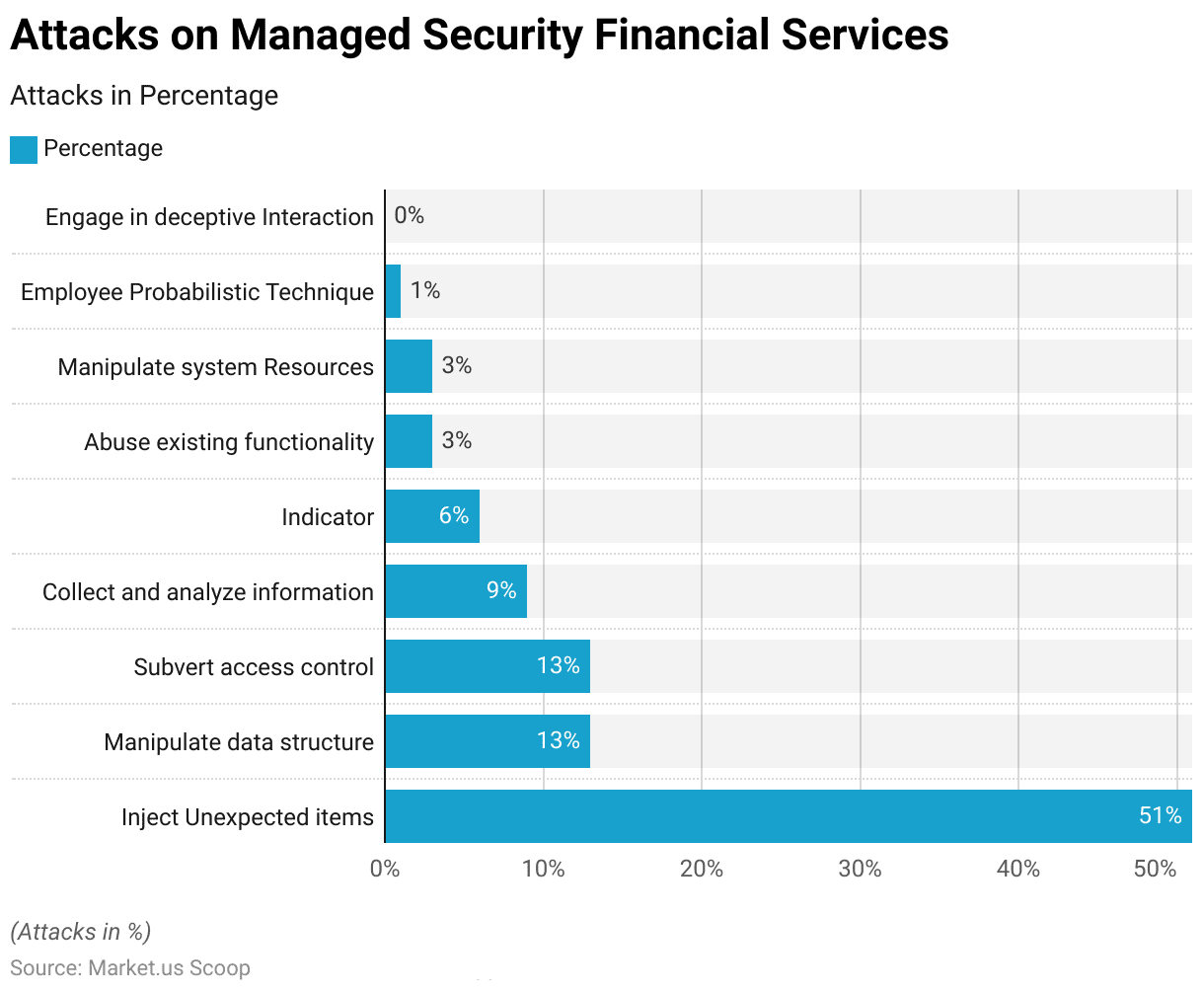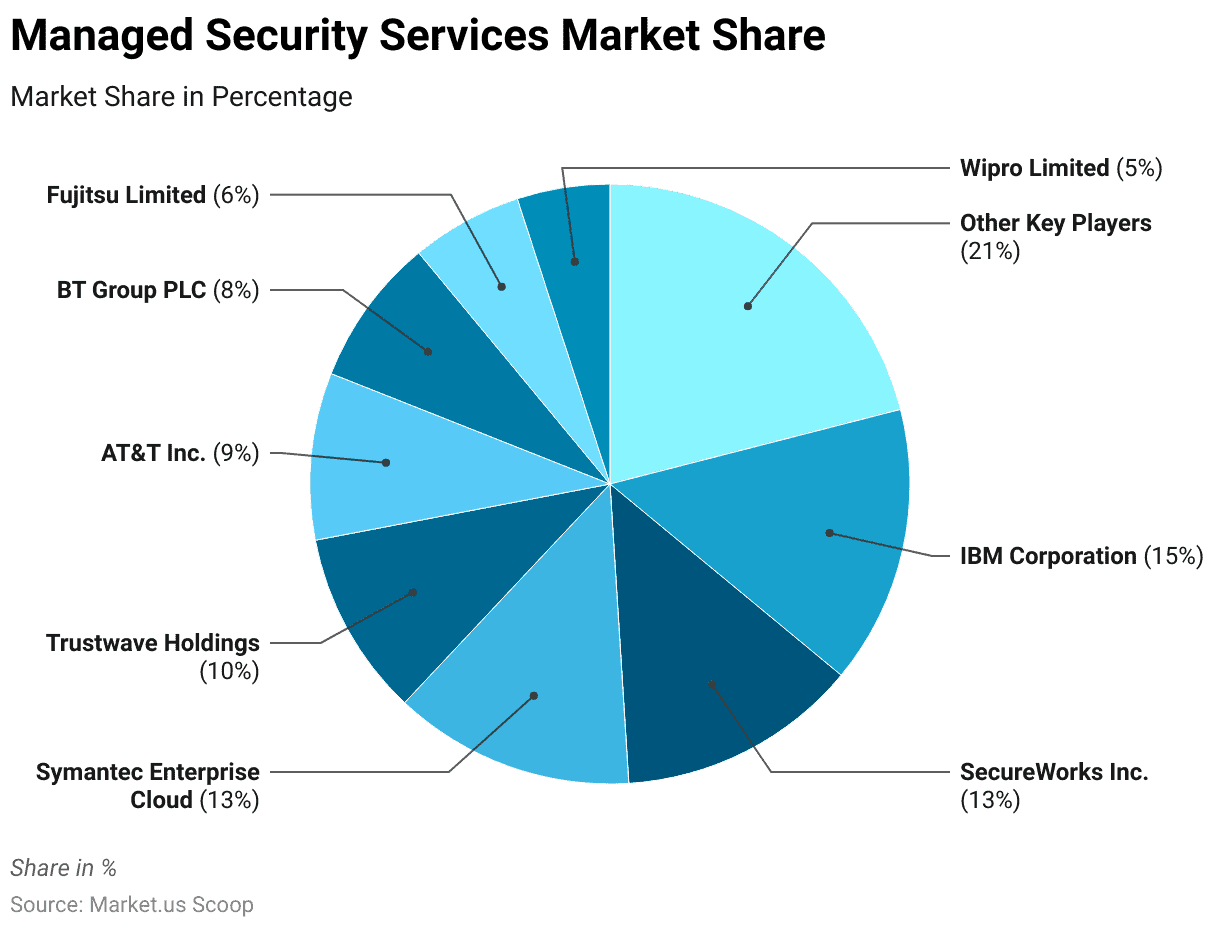Table of Contents
- Introduction
- Editor’s Choice
- Managed Security Service Market Size Statistics
- Reasons to Adopt Managed Security Services Statistics
- Managed Security Services in Healthcare Statistics
- Security Services in Finance Statistics
- Managed Security Services in Manufacturing Statistics
- Statistics by Key Players in Managed Security Services
- Market Share of Key Players
- Managed Security Services Challenges Statistics
- Managed Security Services Benefits
- Recent Developments
- Conclusion
- FAQ’s
Introduction
Managed Security Services Statistics: Managed security services. Often called MSS Encompass is a holistic strategy for protecting an organization’s digital assets and infrastructure.
These services are entrusted to specialized providers who deliver continuous monitoring, identifying threats, handling security incidents, and ongoing security administration.
By harnessing the knowledge and skills of MSS providers, businesses can take pre-emptive measures against cyber threats.
Guaranteeing the confidentiality, integrity, and accessibility of their data and systems. This arrangement enables their in-house teams to concentrate on their primary responsibilities.
This cooperative and proactive approach to security empowers organizations to stay ahead of changing threats and meet compliance obligations in today’s intricate and interconnected digital environment.

Editor’s Choice
- In 2022, the managed security services market size stood at 25.9 billion.
- In 2032, the market is forecasted to reach 74.2 billion.
- In 2017, malware attacks cost businesses $2,364,806, while web-based attacks incurred expenses of $2,014,142, demonstrating the financial toll of these threats
- Phishing and social engineering attacks cost $1,208,978, malicious code incidents amounted to $1,282,324, and stolen devices led to losses of $865,985.
- Healthcare organizations face significant cybersecurity challenges, with 64% reporting concerns about business email compromise and phishing attacks. Yet only 48% have established plans to counter this threat.
- Globally, 80% of companies have experienced one or more security breaches that they attribute to a shortage of cybersecurity expertise and awareness.
- 67% of corporate leaders are concerned that the scarcity of qualified cybersecurity candidates poses extra risks to their organizations.
Managed Security Service Market Size Statistics
- In 2022, the market size stood at 25.9 billion, reflecting the initial point of reference for our analysis. Over the subsequent years, there was a consistent upward trajectory in market growth.
- In 2023, it increased to 28.9 billion, marking a notable rise.
- This growth continued into 2024 when the market expanded further to 31.7 billion.
- The following year, 2025, saw even more substantial growth, with the market reaching 36.3 billion, underlining a steady expansion trend.
- The momentum continued in 2026, as the market size increased to 41 billion, indicating a robust and flourishing market.
- In 2027, the growth trend remained intact, with the market expanding to 45 billion.
- The subsequent years, 2028 and 2029, witnessed continued growth, with market sizes of 48.2 and 53.7 billion, respectively.
- As we look ahead to 2030, the market is projected to reach 59 billion, reflecting sustained growth.
- In 2031, the trend continues, with the market size expected to rise to 65.7 billion, showing a substantial increase.
- Finally, in 2032, the market is forecasted to reach 74.2 billion. Underscoring a consistent growth pattern over the entire analyzed period.
(Source – Market.us)

Reasons to Adopt Managed Security Services Statistics
- The compelling reasons for organizations to consider adopting Managed Security Services (MSS) are underscored by the financial implications of various cyberattacks.
- In 2017, malware attacks cost businesses $2,364,806. While web-based attacks incurred expenses of $2,014,142, demonstrating the financial toll of these threats.
- Denial of service attacks amounted to $1,565,435 in losses, and malicious insider incidents resulted in $1,415,217 in financial damage.
- Phishing and social engineering attacks cost $1,208,978. Malicious code incidents amounted to $1,282,324, and stolen devices led to losses of $865,985.
- Ransomware attacks, a growing concern, accounted for $532,914 in costs in 2017.
- Even botnets, considered less prominent but still significant, contributed to expenses of $390,012. These figures emphasize the critical need for organizations to invest in Managed Security Services. Which can provide proactive threat detection, incident response, and cybersecurity expertise to safeguard against the financial repercussions of these diverse and evolving cyber threats.
(Source – 10XDs)

Managed Security Services in Healthcare Statistics
- Healthcare organizations face significant cybersecurity challenges, with 64% reporting concerns about business email compromise and phishing attacks. Yet only 48% have established plans to counter this threat.
- Unauthorized access contributes to 34% of healthcare breaches. While 61% result from employee negligence, highlighting the need for robust security training.
- Furthermore, 64% express worries about device security, and 63% conduct regular employee cybersecurity training. The vulnerability to supply chain attacks remains high at 71%, with only 44% having documented response plans.
- In terms of financial commitment, healthcare providers allocate 5% of their annual budget to cybersecurity, notably less than the U.S. government, which is dedicated to 16%.
- Alarmingly, just 22% of healthcare IT managers believe their organizations provide sufficient funding for cybersecurity. Underscoring the persistent challenges in this critical sector.
(Source – Gartner)
Security Services in Finance Statistics
- In Managed Security Services for Financial Services, various attacks pose significant threats.
- Injecting unexpected items constitutes a substantial portion, accounting for 51% of attacks. Followed by attacks that manipulate data structures and subvert access control, at 13%.
- A slightly lower but still noteworthy percentage, 9%, involves attacks aimed at collecting and analyzing sensitive information.
- Indicator-based attacks make up 6% of the threat landscape. While the abuse of existing functionality and manipulation of system resources each represent 3%.
- A relatively rare but concerning category involves attacks that employ probabilistic techniques, constituting 1%.
- Finally, deceptive interactions, though less prevalent, are still a concern at less than 1%. These statistics highlight the diverse and evolving nature of threats faced by the financial services sector. Underlining the need for robust Managed Security Services to mitigate these risks and safeguard sensitive financial data.
(Source – Gartner)

Managed Security Services in Manufacturing Statistics
- A recent survey revealed that 72% of executives harbor concerns about the manufacturing industry’s instability due to material shortages and disruptions in the supply chain.
- Manufacturers are allocating a significant portion of their IT budgets to cybersecurity. On average, manufacturing companies dedicate 15-20% of their IT budgets to MSS.
- Manufacturers face a diverse range of cybersecurity threats. The most common include malware and ransomware attacks (45%), phishing attempts (21%), and insider threats (14%).
- MSS has significantly improved incident response times in manufacturing. On average, manufacturing companies with MSS in place can detect and respond to a security incident 50% faster than those without such services.
- The ongoing challenge of material shortages in the manufacturing sector has made organizations more vulnerable to cyberattacks. In the last year, 32% of manufacturers experienced a cyber-incident directly related to supply chain disruptions.
- Compliance with industry-specific regulations is a top concern for manufacturers. 68% of manufacturing executives express concerns about maintaining compliance with laws like data privacy and cybersecurity.
- With the increasing adoption of Industrial Internet of Things (IIoT) devices, manufacturers are investing heavily in IoT security. IoT security spending in manufacturing will increase by 30% over the next two years.
- In manufacturing, 45% of companies partner with Managed Services Providers (MSPs) for cybersecurity services. These MSPs offer a range of MSS, including threat detection, vulnerability management, and incident response.
- Manufacturers struggle to find and retain skilled cybersecurity professionals. 61% of manufacturing companies report difficulty in hiring and retaining cybersecurity talent.
- Ransomware attacks in the manufacturing sector have increased by 40% in the last year. These attacks result in an average downtime of 6 days and a cost of approximately USD 1.5 million per incident.
(Source: Gartner, STL, Forrester Research, IDC)
Statistics by Key Players in Managed Security Services
IBM
- The International Business Machines Corporation (IBM) is a global technology company that provides various services, such as cloud computing, cognitive computing, and security.
- IBM generated $60.5 Billion in revenue. Some of IBM’s Security Management Services (MSS) include threat management and vulnerability management, as well as compliance management.
- The company is well-known in the industry for its commitment to innovation and customer experience.
(Source -365iTSolution)
Secure Works
- Secure Works is a company owned by Dell Technologies that provides various cybersecurity solutions, one of which is threat detection and response (MSS).
- Secure Works generated $ 256 Million in revenue in 2022.
- Secure Works also offers vulnerability management and compliance management. It’s well-known in the industry for its customer service and expertise.
(Source -365iTSolution)
Verizon
- Verizon is a global telecommunications company that provides various services, including cybersecurity.
- Verizon Company generated $136.8 Billion in revenue in 2022.
- Verizon’s MSS services include threat detection and response (TDR), vulnerability management (VMM), and compliance management (CPM).
- Verizon is well-known in the industry for its customer service and expertise.
(Source -365iTSolution)
AT&T
- AT&T, one of the biggest telecom companies in the world, has a lot of different services, and one of them is cybersecurity.
- AT&T generated $ 120.7 billion in revenue in 2022.
- They offer threat detection, response, vulnerability, and compliance management, and they’re known for being innovative and ensuring their customers are happy.
(Source -365iTSolution)
- In the global Managed Security Services (MSS) market, several key players hold significant market shares.
- IBM Corporation leads the pack with a substantial 15% share, followed closely by SecureWorks Inc. and Symantec Enterprise Cloud, each commanding 13% of the market.
- Trustwave Holdings secures a respectable 10% share, while telecommunications giants AT&T Inc. and BT Group PLC contribute 9% and 8%, respectively.
- Fujitsu Limited and Wipro Limited also play notable roles, holding 6% and 5% of the market share, respectively.
- Collectively, these major players dominate approximately 69% of the MSS market.
- The remaining 21% is distributed among other key players, showcasing a competitive landscape in the industry.
- This market distribution reflects the diverse options available to organizations seeking managed security services, with a mix of established technology companies and specialized MSS providers vying for market prominence.
(Source- Statista, Market.us)

Managed Security Services Challenges Statistics
- Globally, 80% of companies have experienced one or more security breaches that they attribute to a shortage of cybersecurity expertise and awareness.
- Additionally, 60% of organizations find it challenging to hire cybersecurity professionals, while 52% face difficulties in retaining qualified personnel in this field.
- Notably, 67% of corporate leaders are concerned that the scarcity of qualified cybersecurity candidates poses extra risks to their organizations.
- Furthermore, 30% of top executives identify insufficient security budgets as their primary obstacle, and 38% anticipate this issue to persist over the next two years.
(Source: Integrity360)
Managed Security Services Benefits
- Concerning managed security services, organizations that employ MDR witnessed a significant 62% reduction in the yearly average of security incidents.
- Typically, MDR users experience a 50% decrease in Meantime to Detect (MTTD) and Mean Time to Respond (MTTR).
- Regarding response times, MDR services boast an average of approximately three hours. Remarkably faster than the 66 hours on average for in-house security teams.
- Moreover, organizations utilizing MDR enjoy up to 50% savings in their cybersecurity operations. This is a substantial cost benefit.
- Regarding incident detection times, organizations with a Security Operations Center (SOC) and no MDR tend to take an average of 32 days to detect a security incident. In contrast, MDR employees can detect such incidents in just 10 days.
- Furthermore, for companies lacking both a SOC and MDR, the average time to detect a cybersecurity incident can extend up to a staggering 212 days, highlighting the critical importance of these services. A study conducted by the SANS Institute underlines the effectiveness of MDR, with 54% of respondents affirming its capability to detect and contain cyberattacks.
(Source: Tausight, Integrity360)
Recent Developments
Acquisitions and Mergers:
- IBM acquires ReaQta: In late 2023, IBM acquired ReaQta, an advanced endpoint security platform. This acquisition aims to enhance IBM’s managed security services by integrating ReaQta’s autonomous detection and response capabilities, providing better protection against cyber threats.
- Palo Alto Networks acquires Crypsis Group: In early 2024, Palo Alto Networks completed its $265 million acquisition of Crypsis Group, a cybersecurity consulting firm. This merger is expected to strengthen Palo Alto Networks’ incident response and risk management services.
New Product Launches:
- Microsoft Defender for Managed Security Services: In mid-2023, Microsoft launched Defender for Managed Security Services, offering comprehensive security monitoring, threat detection, and response services tailored for large enterprises. This new service aims to provide a robust security solution with the backing of Microsoft’s advanced threat intelligence.
- Cisco SecureX Managed Services: Cisco introduced SecureX Managed Services in early 2024, designed to deliver end-to-end security management, including real-time threat intelligence, automated incident response, and security analytics, targeting businesses of all sizes.
Funding:
- Arctic Wolf secures $150 million: Arctic Wolf, a leader in security operations, raised $150 million in a funding round in 2023 to expand its managed security services, focusing on enhancing its security operations center (SOC) capabilities and accelerating global expansion.
- Expel raises $200 million: Expel, a managed security provider, secured $200 million in early 2024 to develop new security solutions, increase its market presence, and invest in R&D to improve its automated detection and response capabilities.
Technological Advancements:
- AI and Machine Learning Integration: Managed security service providers (MSSPs) are increasingly integrating AI and machine learning to enhance threat detection, automate response actions, and provide predictive analytics, improving the overall effectiveness and efficiency of security operations.
- Cloud-Native Security Solutions: Advances in cloud-native security solutions are enabling MSSPs to offer scalable, flexible, and more responsive security services, catering to the needs of businesses migrating to cloud environments.
Market Dynamics:
- Growth in Managed Security Services Market: The global managed security services market is projected to grow at a CAGR of 14.1% from 2023 to 2028, driven by the increasing complexity of cyber threats, the rise in remote work, and the growing adoption of cloud services.
- Increased Demand from SMEs: Small and medium-sized enterprises (SMEs) are increasingly adopting managed security services to protect against cyber threats, reduce security management costs, and access advanced security expertise, contributing to market growth.
Regulatory and Strategic Developments:
- Compliance with Data Protection Regulations: MSSPs are enhancing their services to ensure compliance with data protection regulations such as GDPR and CCPA, providing businesses with the necessary tools and processes to meet regulatory requirements and protect sensitive data.
- US Cybersecurity Executive Order: The US government’s cybersecurity executive order issued in early 2024 emphasizes the importance of securing IT infrastructure, driving demand for managed security services to implement best practices and enhance cybersecurity resilience.
Research and Development:
- Zero Trust Architecture: R&D efforts are focusing on developing and implementing Zero Trust security models that require continuous verification of user identity and access rights, reducing the risk of unauthorized access and improving overall security posture.
- Advanced Threat Intelligence Platforms: Researchers are working on developing advanced threat intelligence platforms that provide real-time insights, threat-hunting capabilities, and proactive defense mechanisms to enhance the effectiveness of managed security services.
Conclusion
Managed Security Services Statistics – In conclusion, managed security services (MSS) are pivotal in modern cybersecurity. They offer organizations a proactive and expert-driven approach to protect their digital assets and infrastructure.
Moreover, the market for these services has demonstrated steady growth, as evidenced by the data provided, with projections indicating a continued upward trajectory.
As cyber threats evolve and become more sophisticated, MSS providers are essential partners in helping businesses navigate the complex landscape of cybersecurity.
Moreover, By outsourcing security monitoring, threat detection, and incident response to specialized MSS providers.
Organizations can focus on their core operations while ensuring the confidentiality, integrity, and availability of their data and systems.
However, This collaborative and strategic approach to security is vital in safeguarding against cyber threats and staying compliant with ever-changing regulations.
As we move into the future, the importance of managed security services is expected to grow, making them a critical component of any comprehensive cybersecurity strategy.
FAQ’s
Managed Security Services are outsourced cybersecurity solutions provided by specialized firms to monitor, detect, respond to, and manage security threats and incidents on behalf of organizations.
Businesses need MSS to enhance their cybersecurity posture, proactively detect and mitigate threats, reduce security risks, meet compliance requirements, and free up their in-house IT teams to focus on core activities.
MSS providers offer various services, including 24/7 security monitoring, threat intelligence, vulnerability assessment, incident response, firewall management, and security compliance reporting.
MSS providers use advanced technologies such as SIEM (Security Information and Event Management), machine learning, and threat intelligence to monitor networks and systems for suspicious activities. When a threat is detected, they employ incident response procedures to mitigate it.
Yes, MSS can be tailored to meet the needs and budget constraints of small businesses, offering them access to enterprise-level security expertise and tools.
The cost of MSS varies depending on the scope of services, the size of the organization, and the level of protection needed. It can range from monthly subscription fees to custom pricing based on specific requirements.
Discuss your needs with our analyst
Please share your requirements with more details so our analyst can check if they can solve your problem(s)



